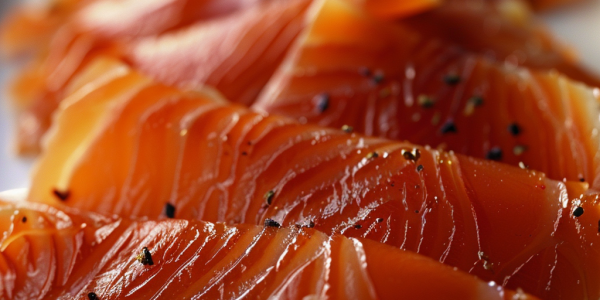Canada to Ban Fish Farms in British Columbia by 2029 Amid Environmental Concerns
The Canadian government has announced a ban on fish farms in British Columbia waters by 2029, a decision driven by concerns over the impact of fish farming on wild salmon populations. This move, following the 2012 Cohen Commission’s findings, aims to protect ecological health while balancing economic interests, especially for Indigenous communities. As stakeholders engage in dialogue, the future of sustainable aquaculture remains at the forefront of environmental conservation efforts.
Salmon Recall Due to Listeria Contamination at Kroger and Payless Stores
Salmon sold at Kroger and Payless grocery stores has been recalled due to potential listeria contamination. Foppen Seafood is recalling its Smoked Norwegian Salmon Slices, specifically the 8.1 oz. ‘toast sized’ cuts sold in 15 states. Listeria, a bacterium that can lead to symptoms such as fever, muscle aches, nausea, vomiting, and diarrhea, was discovered during routine testing. Consumers are advised to discard the salmon or return it to the store for a refund. Stay informed about product recalls and food safety to protect yourself and your loved ones.
Court of Appeals Temporarily Suspends Bankruptcy Proceedings for Nova Austral in Chile
The Court of Appeals in Punta Arenas, southern Chile, has temporarily suspended the bankruptcy proceedings of salmon farmer Nova Austral, sparking interest among industry insiders. This decision offers hope for Nova Austral to reorganize its financial situation and work towards a stable future, highlighting the importance of legal interventions in safeguarding businesses and jobs. Industry analysts are monitoring closely to see how Nova Austral navigates this challenging period, with potential far-reaching implications for the salmon farming sector in southern Chile.
Decades-Old Canned Salmon Reveals Insights into Historical Marine Ecology
Canned salmon has unexpectedly become a treasure trove of historical marine ecology, with decades-old specimens of Alaskan marine life preserved in brine and tin. Parasites found in these expired cans of salmon are providing valuable insights into the ecosystem, shedding light on the intricate web of life in the Pacific Northwestern marine environment. Natalie Mastick and Chelsea Wood, parasite ecologists from the University of Washington, seized the opportunity to study the effects of parasites on marine mammals by acquiring dusty old cans of salmon dating back to the 1970s from Seattle’s Seafood Products Association. These cans, originally set aside for quality control, have now become a valuable archive of well-preserved specimens of marine parasites. Despite the initial revulsion at the thought of worms in canned fish, these marine parasites, known as anisakids, pose no threat to humans when killed during the canning process. In fact, their presence is seen as an indicator of a healthy ecosystem, as they are an integral part of the marine food web. Anisakids enter the food chain when they are consumed by krill, which are then preyed upon by larger species. This intricate life cycle provides important clues about the health and dynamics of the marine environment. The accidental discovery of these preserved specimens has opened up new possibilities for researchers to gain retrospective insights into the historical marine ecology of the region. The study of these parasites promises to provide a deeper understanding of the complex relationships within the marine ecosystem, offering a unique window into the past that could inform conservation efforts and ecosystem management in the future.
Study Shows Permeable Pavements Can Reduce Tire Pollutants Harmful to Salmon
This week’s top engineering news brings a groundbreaking study from Washington State University, revealing the potential of permeable pavements in reducing tire pollutants that are harmful to salmon. The study, published in the journal Science of The Total Environment, highlights…





